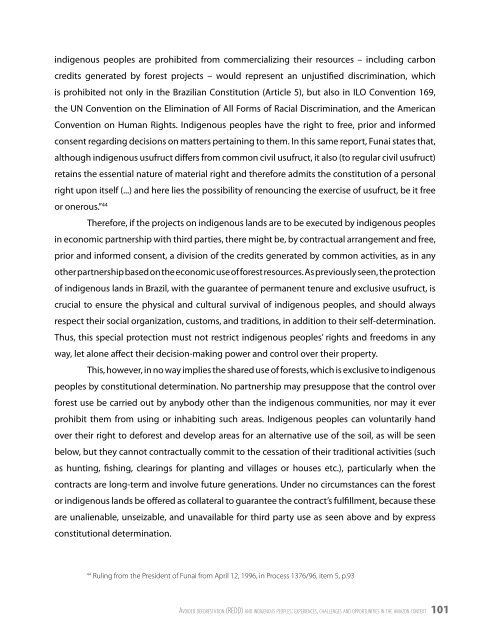Avoided Deforestation (REDD) and Indigenous ... - Amazon Fund
Avoided Deforestation (REDD) and Indigenous ... - Amazon Fund
Avoided Deforestation (REDD) and Indigenous ... - Amazon Fund
You also want an ePaper? Increase the reach of your titles
YUMPU automatically turns print PDFs into web optimized ePapers that Google loves.
indigenous peoples are prohibited from commercializing their resources – including carbon<br />
credits generated by forest projects – would represent an unjustified discrimination, which<br />
is prohibited not only in the Brazilian Constitution (Article 5), but also in ILO Convention 169,<br />
the UN Convention on the Elimination of All Forms of Racial Discrimination, <strong>and</strong> the American<br />
Convention on Human Rights. <strong>Indigenous</strong> peoples have the right to free, prior <strong>and</strong> informed<br />
consent regarding decisions on matters pertaining to them. In this same report, Funai states that,<br />
although indigenous usufruct differs from common civil usufruct, it also (to regular civil usufruct)<br />
retains the essential nature of material right <strong>and</strong> therefore admits the constitution of a personal<br />
right upon itself (...) <strong>and</strong> here lies the possibility of renouncing the exercise of usufruct, be it free<br />
or onerous.” 44<br />
Therefore, if the projects on indigenous l<strong>and</strong>s are to be executed by indigenous peoples<br />
in economic partnership with third parties, there might be, by contractual arrangement <strong>and</strong> free,<br />
prior <strong>and</strong> informed consent, a division of the credits generated by common activities, as in any<br />
other partnership based on the economic use of forest resources. As previously seen, the protection<br />
of indigenous l<strong>and</strong>s in Brazil, with the guarantee of permanent tenure <strong>and</strong> exclusive usufruct, is<br />
crucial to ensure the physical <strong>and</strong> cultural survival of indigenous peoples, <strong>and</strong> should always<br />
respect their social organization, customs, <strong>and</strong> traditions, in addition to their self-determination.<br />
Thus, this special protection must not restrict indigenous peoples’ rights <strong>and</strong> freedoms in any<br />
way, let alone affect their decision-making power <strong>and</strong> control over their property.<br />
This, however, in no way implies the shared use of forests, which is exclusive to indigenous<br />
peoples by constitutional determination. No partnership may presuppose that the control over<br />
forest use be carried out by anybody other than the indigenous communities, nor may it ever<br />
prohibit them from using or inhabiting such areas. <strong>Indigenous</strong> peoples can voluntarily h<strong>and</strong><br />
over their right to deforest <strong>and</strong> develop areas for an alternative use of the soil, as will be seen<br />
below, but they cannot contractually commit to the cessation of their traditional activities (such<br />
as hunting, fishing, clearings for planting <strong>and</strong> villages or houses etc.), particularly when the<br />
contracts are long-term <strong>and</strong> involve future generations. Under no circumstances can the forest<br />
or indigenous l<strong>and</strong>s be offered as collateral to guarantee the contract’s fulfillment, because these<br />
are unalienable, unseizable, <strong>and</strong> unavailable for third party use as seen above <strong>and</strong> by express<br />
constitutional determination.<br />
44 Ruling from the President of Funai from April 12, 1996, in Process 1376/96, item 5, p.93<br />
Av o i d e d d e f o re s t A t i o n (redd) A n d i n d i g e n o u s p e o p l e s: experiences, chAllenges A n d o p p o r t u n i t i e s in t h e A m A zo n c o n t e x t 101
















